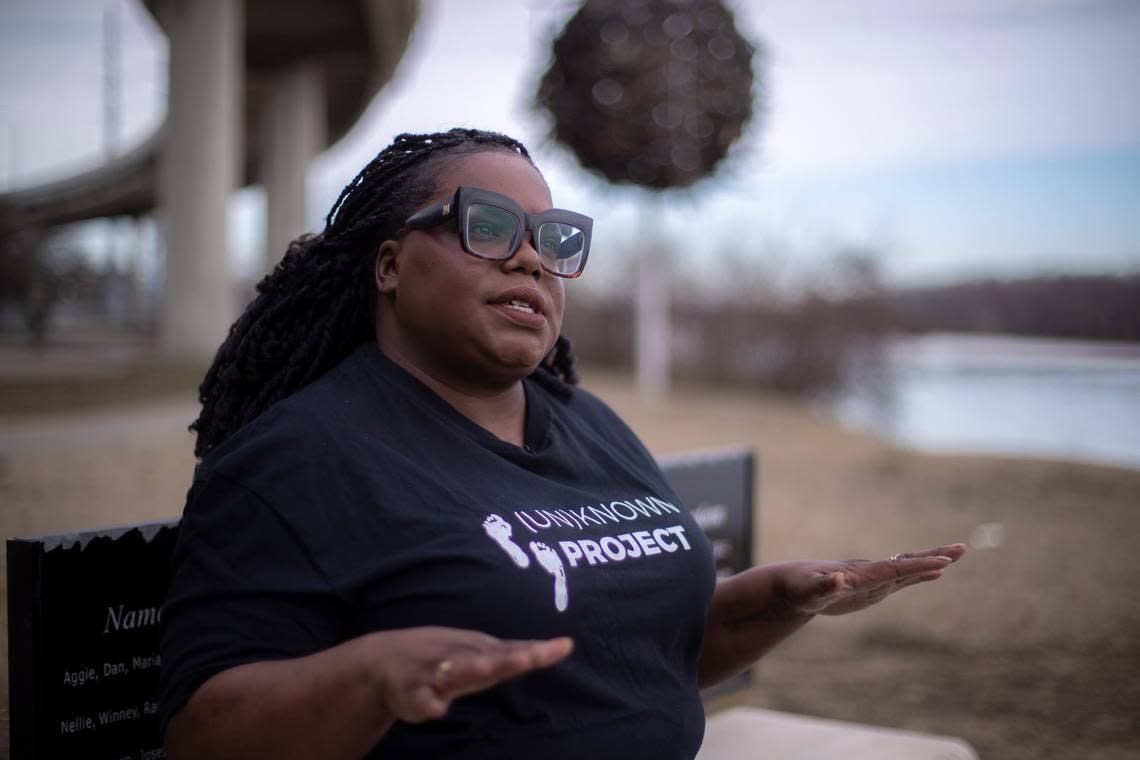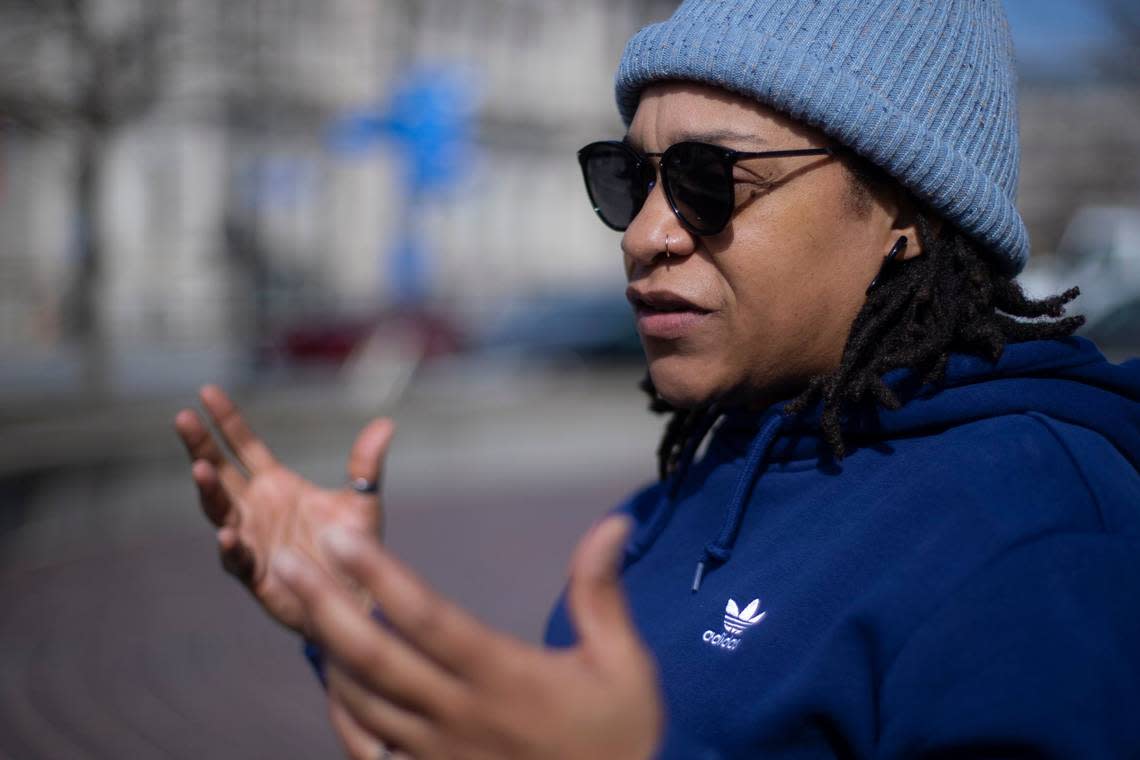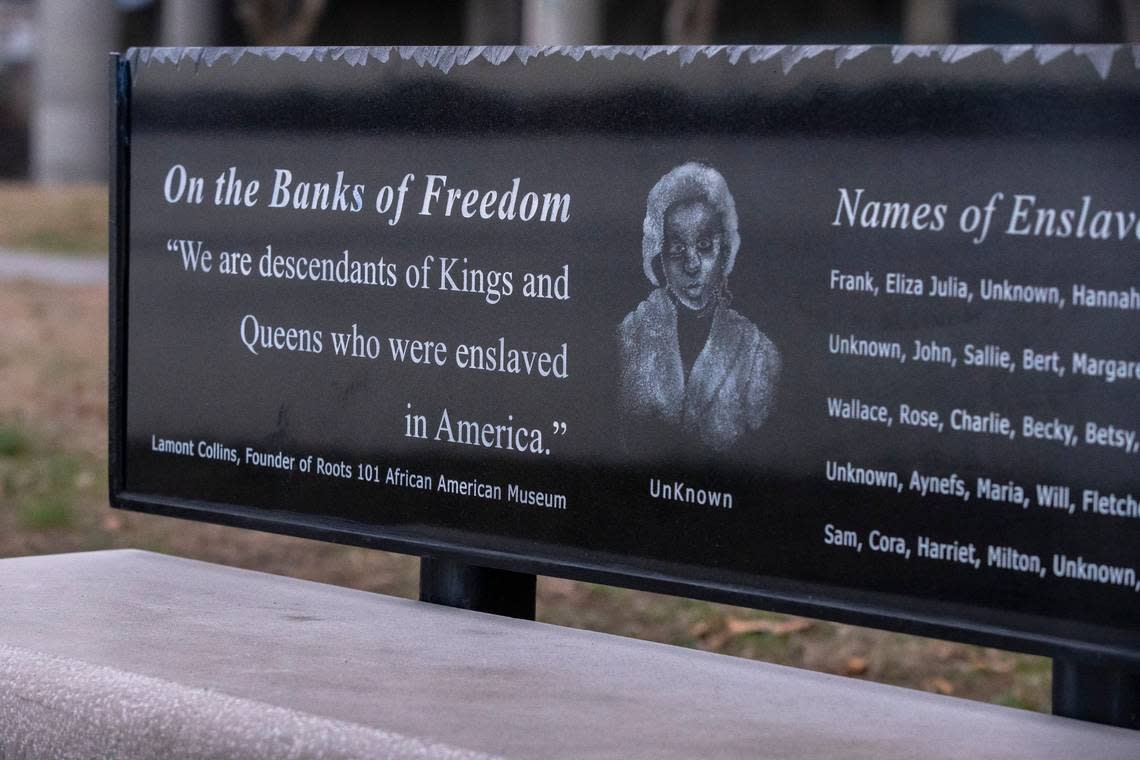#SayTheirNames. Three years after Breonna Taylor, what has Kentucky learned? | Opinion
Every second Saturday, poet and activist Hannah Drake stands on the muddy banks of the Ohio River under the columns of Interstate 64 and recites people’s names.
Aggie and Dan and Maria and Sam are just a few of the enslaved people who lived and worked in bondage in Louisville just across the broad river from freedom, people hidden, forgotten and unknown.
“Slavery is the story of America,” Drake said. “It’s the story of America that we don’t want to talk about.”
The names that Drake and her partner, Josh Miller, at the nonprofit Ideas xLab have found, are emblazoned on the two benches that overlook the Ohio, harnessed to the ground with the kind of chains used to bind humans together as they made their way to the slave market at Second and Main. Cement footsteps point toward Indiana, with loose buttons, which the enslaved would leave behind at markets as a reminder.
Before this small corner of riverbank was a reality, Drake wrote the poem “Finding Me:”
Can I find pieces of your memory in cotton fields and red mud?
Scattered bones in unmarked graves that attempt to erase you from history
But you were here.
You were always here.
You existed.
Unknown no longer.
I found your name ... I found you
And in finding you, I found me.
These days, people bring Drake the names. They say ‘my family enslaved people and here are some of the names,’ they have on pieces of paper or old ledgers,” Drake said. “People held on to the information because they’re ashamed.”
One woman emailed her a copy of a ledger from her family, showing they had owned 50 people, a huge number for the non-plantation slave economy of Kentucky.
“I say ‘you don’t have to carry that shame but you’re holding onto it because you are ashamed.’ The truth sets people free, not your shame.”
Drake takes a more pragmatic approach to historical guilt, one that might be more acceptable to many. Think of our racial past like breast cancer or diabetes, she says. “Talking about cancer does not cause cancer, but it might cause someone to get a checkup. It’s education and learning and growth.”
The doctor doesn’t hate you, the doctor is interested in your past, what you ate, what your risk factors are. The doctor wants to heal you and he can’t do that until he understands what’s wrong.
That’s why Drake writes and speaks these names. Why, when we learned about how Breonna Taylor was killed in March 2020, she spoke her name over and over again in poems and speeches and protests. Breonna was killed in March, but as Drake points out, her name was hidden until May, when an explosive racial reckoning began in Kentucky and across the country.

Black history
The (Un)known Project is an interesting one to ponder in the waning days of Black History Month, three years and less than a mile away from the Breonna Taylor protests in Jefferson Square Park. We know more than we ever have about Kentucky’s history of enslavement — such as a new book on our beloved state song that peels back some unsavory truths, or new scholarship of the lives of the enslaved in a state that didn’t talk much about it. As UK historian Gerald Smith wrote in a new book he edited, “Slavery and Freedom in the Bluegrass State: Revisiting My Old Kentucky Home: “Like much of the state’s racial past, the search is ongoing for truth and reconciliation. The killing of Breonna Taylor was an awakening for a state that had been lulled to sleep for generations by the melody of ‘My Old Kentucky Home.’ But now is the time to keep revisiting that past to better understand the present and to build and reshape our interpretation of Kentucky history.”
Sometimes, though, it seems as though only small circles of activists, artists, and academics are willing to do that. These days, people are more interested in complaining about “wokeness” than police brutality, more concerned with banning the books and hiding the history that is, as Drake says, so central to our past.
Three years after Breonna Taylor, where are we? In the midst of another legislative session and a GOP gubernatorial primary where Taylor’s name is conspicuously absent. Instead we have bills that try to ban books about the civil rights movement, or govern what “controversies” teachers can teach. In Frankfort the prevailing narrative is that the Breonna Taylor protests, “riots” is the word you hear more, practically destroyed Louisville, a concept that might surprise the tourists who filled Main Street on a recent Saturday afternoon. Just last year, Sen. Danny Carroll filed legislation, not to address police brutality, but to allow police to arrest anyone who called them mean names.
The legislature banned some use of no knock warrants statewide. Its main answer to the racial justice protests was the West End TIF, a sprawling, amorphous economic development tool that works poorly at the best of times, and in this case, would have all safeguards taken away.
Attorney General Daniel Cameron could not convince a grand jury to indict any Louisville police in Breonna Taylor’s death, (just for firing into a neighbor’s apartment). A year later, federal authorities charged four of them. Cameron is now the front-runner in the GOP primary with a campaign that stresses law and justice. He is the first Black candidate elected to statewide office and the first to run for governor but shows little interest in the issues that affect most Black people in the state. His website currently boasts that he led the fight against Critical Race Theory.
One reason the GOP political majority in this state doesn’t talk about these issues is because they don’t have to. The Black population is just 8 percent, mostly found in cities like Lexington and Louisville. Thanks to gerrymandering, those representatives are largely outnumbered. As Democrats used to do when they were the majority, Republicans have largely ignored the current minority, choosing to sideline their bills by not even assigning them to committees.

Little change
One of the newest members of that minority, Rep. Keturah Herron, D-Louisville, says life for many in Louisville is largely unchanged three years later.
“People in the West End (of Louisville) are still facing food insecurity, housing insecurity,” she said. “It’s hard, I don’t know what the tangible things are that have changed.”
We met in Jefferson Square Park, sometimes known as Injustice Square Park, which now has a historical marker for the 2020 Racial Justice Protests. Herron said she’s seen more tangible change from the protests in Lexington, where Black women swept county offices in 2022, including County Attorney, Commonwealth Attorney, and three Black women now serving on the Fayette Urban County Council. In particular County Attorney Angela Evans crushed incumbent Larry Roberts who refused to drop charges against Black Lives Matter protesters.
She sees Kentucky’s history, like America’s, as cyclical. We move forward, we go back. As an example, Herron is working on the same kinds of gun violence programs that one of her predecessors, Rep. Eleanor Jordan worked on in 1996.
“When you look at the history, we want to talk about the issues, but people don’t want to hear Breonna Taylor’s name anymore,” she said. “Kentuckians have always want to deny their role in racism and slavery and the plight of Black Kentuckians. And poor white Kentuckians.”
As a new lawmaker, Herron is trying to be pragmatic in working with Republican counterparts, learning to understand the byzantine state budget system, and trying to get more federal dollars to flow for projects like violence reduction.
“There’s so much work to do and we just have to keep doing it,” she said.
That’s also the consensus of Rev. L. Clark Williams in Lexington, who worked with the Black Faith Leaders coalition to ban no knock warrants in Lexington. He also chairs The People’s Campaign, which tries to get people across the state more engaged with electoral politics.
“Whenever you have the kind of majority Republicans have in the Legislature, you see clearly that they have the ability to do whatever they want to do,” Williams said. “The onus on those of us who see that as problematic is to look at ways to put some kind of checks and balances.”
The electorate did that last fall when they rejected an amendment to give the legislature more power. Whether the electorate will feel that checks and balances should be maintained with a Democratic governor and a Republican legislature will be seen. But those who feel disenfranchised right now have to put in the work.
“The key to continued progress is around building strong organizations that can sustain the work,” Williams said. “The opportunities that arise out of tragedies are just that for moments in time — those will not sustain progress. The way to sustain progress is commitment to the work to get changes that we’re seeking.”

Doing the work
Drake and Miller would like to see the (Un)Known Project expand to other states, where people are anxious to uncover more names and more stories about our ignored past and present. Someone who heard about the project recently connected Drake to her one of her own ancestors, an enslaved woman in South Carolina, through paperwork and DNA research. She had not been able to trace her family back more than two generations. It’s hard and meticulous work to find people who were hidden because it didn’t fit our national narratives about the land of the free.
America can only get healthy, Drake believes, when it faces the facts about its past. Then we can all do the work to get better, even in Kentucky. When we face the facts about slavery and its legacy in poverty, criminal justice, inequality, then maybe we can move forward.
But “until Ky faces itself we will be here again and again and again,” she said. “And I hate to say that, but it’s just the truth. we continue to go around the same mountain. We have a time to get something right, to do something different.
“We are supposed to be learning something and we keep missing it.”
